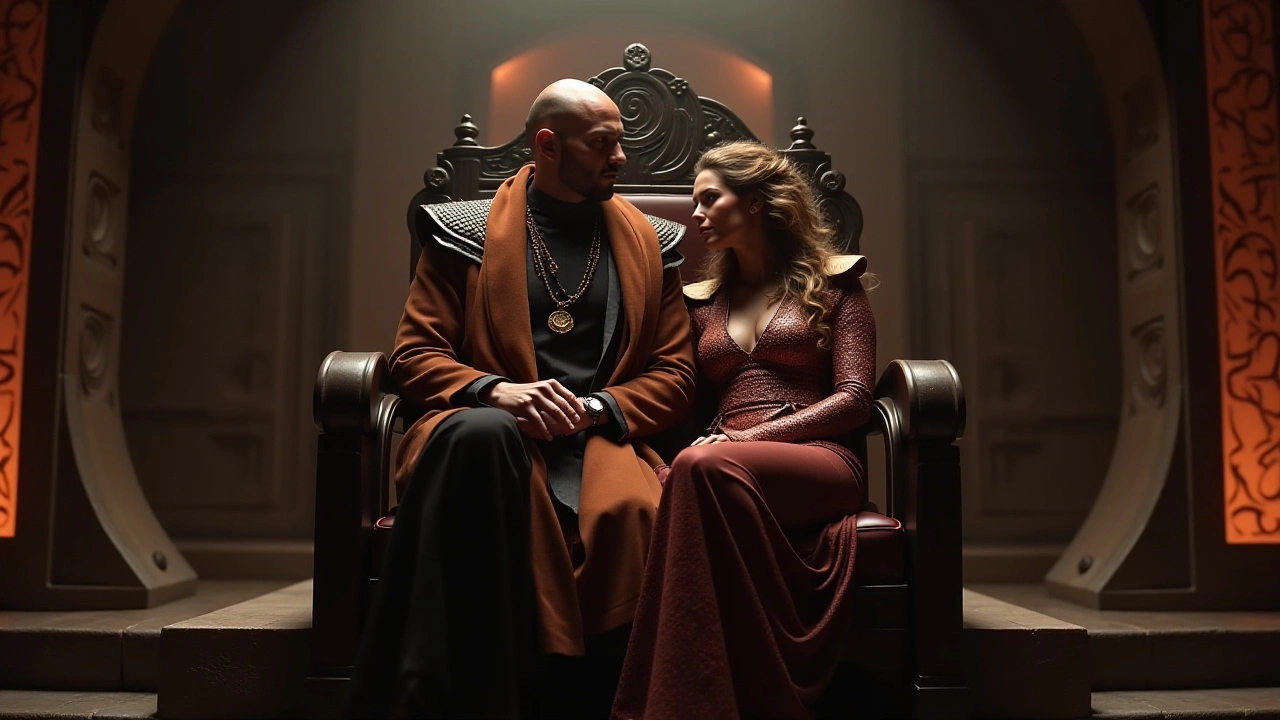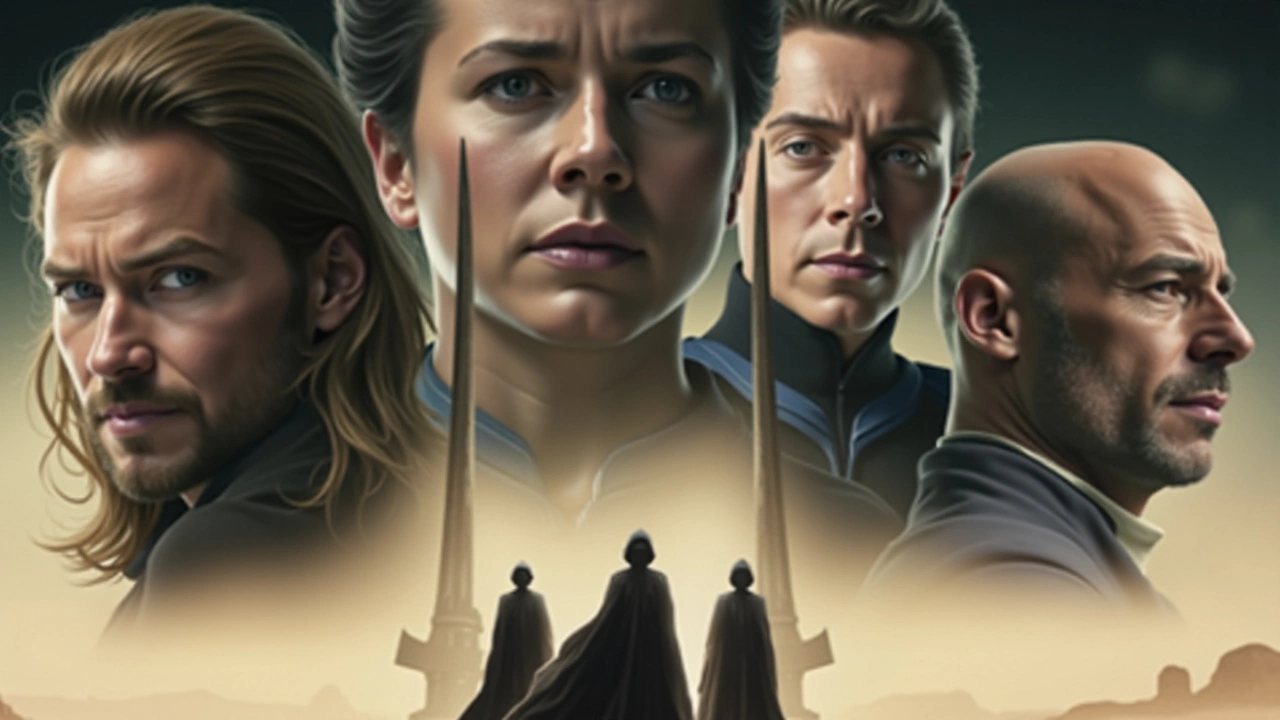HBO's 'Dune: Prophecy': Exploring the Origins of the Bene Gesserit Sisterhood

The Fascinating Backdrop of 'Dune: Prophecy'
HBO's new series 'Dune: Prophecy' delves into the origins of the Bene Gesserit sisterhood, introducing audiences to a universe steeped in intrigue and danger. This prequel, inspired by the novel 'Sisterhood of Dune' by Brian Herbert and Kevin J. Anderson, unfolds 10,000 years prior to the events seen in Denis Villeneuve's 'Dune' films. The series offers a narrative anchored in lore and mythology, depicting the formative years of a powerful and enigmatic sisterhood. While the novels provide a foundation, the show's adaptation attempts to weave its own distinct narrative. From mind control to the aversion of 'thinking machines,' the series explores themes that resonate deeply with science fiction enthusiasts.
The Intrigue of Harkonnen Sisters Valya and Tula
Central to the storyline are Valya (played by Emily Watson) and Tula (played by Olivia Williams), two sisters from the notorious Harkonnen family. As they navigate their lives and struggles in an evolving universe, viewers are treated to a blend of political maneuvering and deep personal growth. The sisters are more than mere characters; they symbolize the intricate and ambitious nature of the 'Dune' world. On their journey, Valya and Tula encounter various dynamic individuals, each adding unique layers to the tale. Their narrative is explored through captivating storytelling that brings depth and rich emotional textures to the forefront. Through these unique character dynamics, the audience gains insight into the factors shaping leadership within the Bene Gesserit.
The Political Landscape and Its Characters
In 'Dune: Prophecy', the world is not solely occupied by the Harkonnen sisters. It also introduces us to a myriad of intriguing and complex characters, including Mark Strong's portrayal of Emperor Corrino. As the ruler of this expansive universe, his actions ripple through the narrative, impacting both friends and foes alike. Characters like Princess Ynez, brought to life by Sarah-Sofie Boussnina, and her half-brother Constantine, played by Josh Heuston, traverse power dynamics within the empire. These characters represent contrasting threads of ambition, loyalty, and familial bonds. Simultaneously, their presence deepens the tension and intrigue, woven seamlessly into the narrative of 'Dune: Prophecy'.
The Production Aesthetic: Crafting a Unique Visual Identity
Although it's nearly impossible to discuss 'Dune: Prophecy' without drawing comparisons to its cinematic predecessors and contemporaries, the series attempts to carve out its own niche. Showrunner Alison Schapker infuses a nerdy appeal into the show, which indulges in unique inventions like vape-cum-gas masks. These creative touches aim to captivate viewers, enhancing its identity and richness. Yet, despite its strengths, some might argue it lacks the breathtaking visual allure of Villeneuve's films or the grandeur associated with 'House of the Dragon'. This struggle with visual identity could be one factor why some fans feel 'Dune: Prophecy' doesn't fully exploit the potential of its universe.

Analysis: Strengths and Comparative Weaknesses
An analysis of 'Dune: Prophecy' sees praise for its imaginative flourishes, engaging character arcs, and evolving storytelling. Its exploration of mind control, depicted through the complexity of the Bene Gesserit sisterhood, sparks curiosity in any lover of science fiction. Yet, for all its merits, some fans might find that the supposed epic nature, expected with the 'Dune' label, doesn't always manifest as grandly as desired. While drawing on comparisons with other shows and films of its kind, fans long for climactic moments that rival those of its cinematic predecessors. Runs of dialogue and eerie ambiance coupled with pacing may leave eager viewers anticipating more pivotal events throughout its progression.
Expectations Versus Reality: The Stigma of High Standards
Fans of the 'Dune' universe come to 'Dune: Prophecy' with specific imaginings of what constitutes a stellar adaptation. They anticipate iconic scenes filled with charismatic characters, bursting forth with engaging confrontations. Therein lies a fundamental challenge of adaptation – satisfying the high standards set by audience expectations. Despite evident improvements made across various episodes, 'Dune: Prophecy' faces the ominous comparisons to both 'House of the Dragon' and Villeneuve's notable films. This comparative lens creates a perception of the series being 'a little spiceless' — an adjective some reviewers use to describe its slower, nuanced progression in contrast to briefer, cinematic works.
The Progression and Promise of 'Dune: Prophecy'
In defense of 'Dune: Prophecy', however, there remains an assured promise of growth and potential. The show's willingness to delve into unexplored territories of the 'Dune' world signifies its intention to expand and differentiate itself from direct interpretations. As it progresses, it starts to build an intrigue and tension reflective of its inner narrative ambitions. Although the initial reception features mixed diagnoses, there lies an undeniable commitment to stay close to its core science fiction ethos. As with any intricate series designated with exploratory seasons, audiences might witness an evolution in style and substance, reaching towards its deserved place within the canon of adaptations.
Conclusion on the Path Ahead
The verdict on 'Dune: Prophecy' ultimately depends on what the audience is willing to glean from its storytelling journey. This adaptation, filled with complex characters and narratives, surely seeks to retain beloved elements of the 'Dune' universe while establishing a fresh foundation. Viewers wanting to immerse themselves and explore these layers should embrace the series as a detailed chapter in this science fiction legacy, given the potential for captivating arcs yet to unfurl. What emerges is not just a standalone series, but part of a continuum sparking discourse on beloved franchises — a powerful testament to the far-reaching influence of 'Dune' in today's cultural landscape.
Delving into the Bene Gesserit’s early cognitive training reveals a sophisticated neuro‑architectural framework that the show skillfully dramatizes.
The terminology like "prana‑bindu" is peppered throughout, satisfying hardcore fans while keeping newcomers anchored.
By positioning the Harkonnen sisters as both political operatives and spiritual apprentices, the narrative creates a compelling duality.
Such a blend of intrigue and doctrinal exposition aligns well with the broader Dune metaplot.
Overall, the series establishes a robust foundation for future myth‑building without sacrificing immediate engagement.
The timeline mentioned in the third episode mistakenly places the sisterhood’s founding ten centuries earlier than the source material indicates.
According to the canon, the origins trace back to roughly 10,200 years before the events of the original Dune, not 10,000 as the recap suggests.
Furthermore, the use of "mind‑control" rather than "prana‑bindu" misrepresents the nuanced training methodology.
These inaccuracies, while minor, could confuse viewers unfamiliar with the intricate lore.
The misstatement about the chronology undermines the series' credibility, especially for seasoned readers who value precision.
Such slip-ups reveal a superficial engagement with Herbert’s densely layered timeline.
When adaptations blur foundational details, they risk alienating the core audience that sustains the franchise.
Visually it feels like a washed‑out postcard of a desert.
The portrayal of the Bene Gesserit as an archetype of hidden epistemic power invites a deeper philosophical reflection on agency versus determinism.
By framing the sisterhood’s rituals as both liberation and control, the show mirrors contemporary debates about knowledge as empowerment.
Valya and Tula embody the dialectic between personal ambition and collective destiny, a tension that resonates beyond the fictional setting.
This narrative choice subtly interrogates the ethics of shaping future generations through prescribed doctrines.
Such thematic layering enriches the viewing experience, prompting audiences to contemplate the cost of foresight.
The narrative ambition of ‘Dune: Prophecy’ deserves earnest commendation for its willingness to excavate the pre‑imperial mythos of the Bene Gesserit.
By foregrounding the formative rites and doctrinal codices, the series offers an educational scaffold that even seasoned Dune aficionados may find enlightening.
Moreover, the interpersonal dynamics between Valya and Tula are rendered with a nuanced emotional calculus that transcends mere plot mechanics.
Their sibling rivalry, laced with political intrigue, mirrors the broader tensions that will later define the Great Houses.
The production design, while occasionally borrowing visual motifs from Villeneuve’s cinematic vision, introduces original aesthetic signatures such as the vapor‑infused respirators that reinforce the techno‑spiritual dichotomy.
These design choices, combined with a soundtrack that oscillates between minimalist drones and sweeping orchestral swells, cultivate an atmosphere conducive to both introspection and awe.
From a writing standpoint, the dialogue balances exposition with character‑driven humor, a feat rarely achieved in high‑concept sci‑fi television.
While some viewers may perceive a pacing lag in early episodes, this measured tempo allows for character development that pays off in later arcs.
The inclusion of mind‑control rituals is handled with a respectful nod to Frank Herbert’s original terminology, avoiding gratuitous mysticism.
Additionally, the series does not shy away from confronting the ethical implications of genetic engineering, a core theme that resonates with contemporary bioethical debates.
For audiences seeking a bridge between the literary source material and the visual spectacle of modern streaming, ‘Dune: Prophecy’ positions itself as a valuable intermediary.
It invites viewers to engage with the philosophical underpinnings of destiny versus agency, a conversation that the original novels famously provoke.
In terms of casting, the performances of Emily Watson and Olivia Williams anchor the show with gravitas, delivering scenes that feel both intimate and epic.
The supporting ensemble, including Mark Strong’s calibrated imperial presence, further enriches the tapestry of power.
Overall, the series merits continued viewership, as its evolving storytelling promises to deepen the lore while honoring the spirit of Herbert’s universe. 🙂
While the optimism in your analysis is noted, the show still stumbles over repetitive visual tropes that dilute its dramatic potential.
The pacing, though intentional, often drags, leaving a memory of a sluggish narrative arc.
Nevertheless, the core premise retains enough intrigue to warrant a second look.
Future episodes must seize the momentum or risk fading into mediocrity.